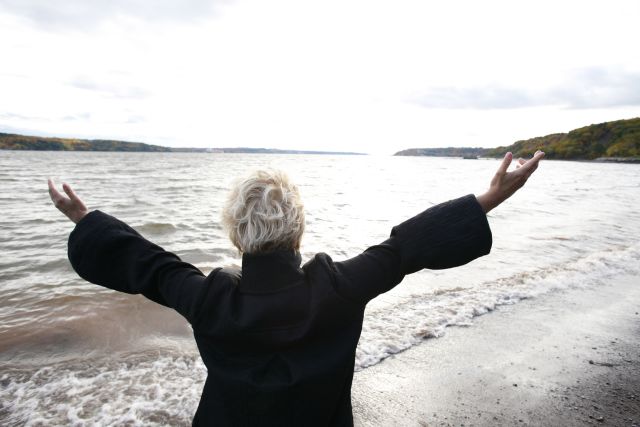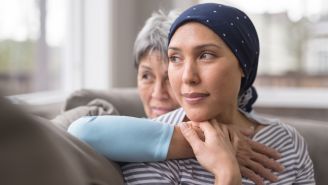Like many people, Josie*, 53, didn’t think twice about getting her annual physical in October 2015. Once it was over her doctor suggested she get her mammogram, since she was already in the building. Despite having a sister who is a breast cancer survivor, all Josie could think of was how the screening would make her late to her job in downtown Dallas—so she decided against it.
But as Josie was leaving, she felt some kind of force change her mind and make her go back in.
“In my head I say it’s my father—who passed away a few years ago and is my angel—who pushed me back in. If I hadn’t gone back in, I don’t know where I’d be right now,” says Josie.
Something also made her decide to have a 3D mammogram, which is often not covered by insurance.
“I said whatever it costs, let’s just do it,” she says.
A few days later Josie’s doctor called to tell her there were some abnormalities in both breasts and she needed further diagnostic imaging. The initial diagnosis, following an ultrasound and multiple biopsies, was that Josie had Stage 1A breast cancer in her right breast; her left breast was suspicious of carcinoma as well.
Josie’s doctor referred her to breast surgical oncologist Amelia Tower, DO, of Medical City Alliance in Fort Worth, Texas, to begin treatment. Josie’s first point of contact was Jordan Henderson, RN, a nurse navigator on Dr. Tower’s team at Medical Center Alliance.
“I'm the one who actually tells the patient their diagnosis,” says Henderson. “I am there from day one, and then continue to support and educate patients throughout their whole journey. A lot of times when someone is diagnosed it's their deer in the headlights moment, and I'm there to pick up the pieces and make sure that they're going in the direction that they need so that they can get the treatment they need.”
Sharecare spoke with Josie, Dr. Tower and Henderson to get an inside look at Josie’s courageous fight against breast cancer.
Sharecare: Josie, tell us a little bit about yourself.
Josie: My husband and I have two wonderful children, a beautiful granddaughter with another one on the way. I have a tight family and we all take care of each other. Have you ever seen my Big Fat Greek Wedding? Well, that’s us. … I work at a law firm and have been working with one of the attorneys for, like, 25 years.
SC: What was your reaction when the abnormalities showed up?
Josie: At the point where I had the biopsy set up I had told only my husband and my sisters. I did not tell the rest of my family. I held it in and everyone kept saying oh, it's nothing … then the biopsies came in.
Within days she met with Dr. Tower to further discuss her diagnosis and treatment options.
SC: What happens at that first appointment?
Dr. Tower: That is what I call the diagnosis appointment, where we go through what led you here, what's going on with your very thorough history and physical, and start individualizing the treatment plan. Patients don’t have to make a final decision on their treatments at this time, because it's so overwhelming.
SC: What was it like going to that first appointment to meet with Dr. Tower?
Josie: It was a scary experience for [my husband and me] obviously. Dr. Tower gave us the description of what the cancer was. That's where the crying came in the most, but as my husband held my hand and we walked out the door after the appointment, we said to each other… we're going to be fine.
SC: What is your approach to breast cancer treatment?
Dr. Tower: Breast cancer is a very difficult, complex disease and you need multiple physicians to help treat the patient. It's not an individual solo sport. Josie first met with a medical oncologist to discuss hormone therapy options and a plastic surgeon for reconstructive surgery options. When she came back to me she was able to make her surgical decision and what route she wanted to go to treat this disease. It's a multidisciplinary approach.
Josie opted to have a bilateral mastectomy (removal of both breasts) with reconstructive surgery. During surgery and examination of the lymph nodes, 12 lymph nodes were removed. Breast cancer cells were found in 10 of them; the final stage was determined to be Stage 3A. Since 10 tested positive, Josie qualified for chemotherapy. Subsequent surgery was performed for inserting a port, which would be used once chemotherapy began.
SC: What has been the most challenging part of this journey for you?
Josie: The most challenging thing is I take care of my whole family. What really destroyed me was not being in charge any longer. That, to me, that's the hardest.
SC: And how do you stay positive?
Josie: It's hard to stay positive, but I know that ... I can't walk around like a zombie. Me, it's just knowing that I have my grandchildren, my children, my family. I'm not ready to go—there’s way too much to do. I just can't have cancer take over my personality. The other day I was feeling so bad and my friends called to see if I wanted to go out for dinner, and I said I can't. They just ring the bell and come on in. They brought me some flowers, a book, a journal to write into. A half hour later, I'll sit there and realize, this is not me. Cancer is not going to take over me. That is mainly my whole thing. Also, I have a team of doctors, nurses, my family, who is the biggest obviously, my friends and my work. I'm just extra special, I feel, in this category. How could you have all of this and not try to be positive about it?
SC: What advice would you have for others in a similar situation?
Josie: Take it day by day. And if you're going to do some research get it from the professionals. Also, don’t focus too much about what’s going to happen in the future. If I think of what's going to happen three weeks from now it'll worry me … If I stop thinking about it, I’ll stop worrying about it.
SC: Dr. Tower, what would you like patients to know?
Dr. Tower: Breast cancer is a crisis, and it is scary, but if you’re educated and you're comfortable with your team, then it can be an opportunity for you to beat it and keep going throughout your life … you can walk out and still be the same person, and still have your job, and your career, and your goals, and your family. You are a little different in many ways. It’s just a new different … you can still be happy to have that new different and accept that new you.
Josie is currently finishing chemotherapy treatments with her medical oncologist. She’ll then undergo radiation, followed by endocrine therapy. Josie also participates in a program developed by Dr. Tower called HEROES Survivorship Program. HEROES (Health & Educational Resources for Our Extraordinary Survivors) stresses the importance of surveillance, prevention and education, and provides the resources to maintain physical, emotional and mental health after a cancer diagnosis for both the patient and family.
*for her family’s privacy, Josie has chosen not to reveal her last name






